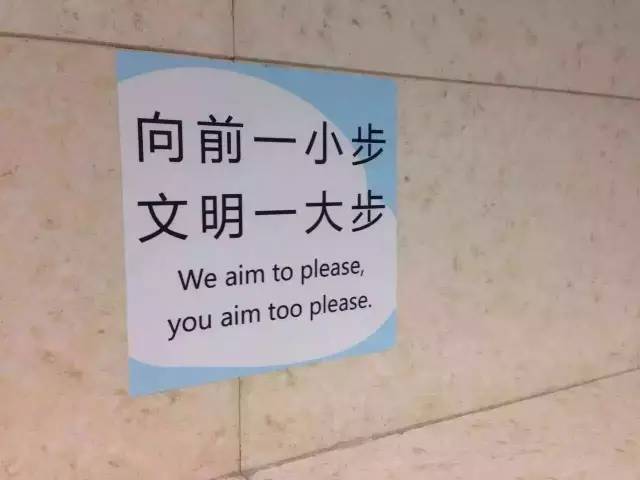You aim too please
« previous post | next post »
From a men's room at the Beijing airport:

(Source)
The Chinese says:
xiàng qián yī xiǎo bù, wénmíng yī dà bù 向前一小步,文明一大步
("one small step forward; one big step for civilization")
This is a meme that we have previously covered on Language Log, e.g.:
"Signs from Kashgar to Delhi " (10/11/13)
It is, of course, based on the famous Neil Armstrong quotation, which has been repeatedly examined on Language Log:
- "One small step for…"
- "Remembering Neil Armstrong and his 'one small step'"
- "One small step backwards"
- "Armstrong's abbreviated article: notes from the expert"
What is curious about this iteration of the Chinese men's room meme is the ingenious English translation:
we aim to please,
you aim too please.
Although this is more of a paraphrase than a translation, it gets the idea across quite effectively.
What the signmaker has done is to take a clever, preexisting English admonition (for examples, see the WeChat source cited above beneath the picture) and match it with a hackneyed Chinese injunction. The result, at least to me, is both witty and effective, with the Chinese and the English mutually reinforcing each other.
[h.t. Apollo Wu]
Ben Zimmer said,
June 20, 2016 @ 10:14 am
The "you aim too please" joke is pretty ancient. Eric Partridge's A Dictionary of Catch Phrases (1977) quotes an American correspondent saying it was a common graffito "up to, say, 30 years ago, above the urinals in a men's toilet (esp. that of a bar or a restaurant)."
Y said,
June 20, 2016 @ 12:27 pm
I saw it about 20 years ago (at a café/gas station in Virginia, I believe.)
Fritz said,
June 20, 2016 @ 1:20 pm
The play on words appears in several editions of Fromkin and Rodman's Introduction to Language in the 1970s.
charles wells said,
June 20, 2016 @ 2:45 pm
I remember seeing that in rest rooms a long time ago, but not recently.
Rube said,
June 20, 2016 @ 3:29 pm
Yes, this is an ancient joke. Seeing it in Beijing in the 21st Century is something I never would have expected – the world has changed a lot in my lifetime.
David Marjanović said,
June 20, 2016 @ 3:45 pm
"Tritt näher!
ER
ist kürzer, als du denkst!"
Disclaimer: I haven't seen this myself, I've only read about it.
"Step closer!
HE
is shorter than you think!"
George said,
June 20, 2016 @ 4:23 pm
@David Marjanović
I have seen that one, in Swaziland as it happens. Toilet humour, uniting the world.
Karl Weber said,
June 20, 2016 @ 6:52 pm
What is the Chinese equivalent of "Welcome to our ool"?
Victor Mair said,
June 20, 2016 @ 7:52 pm
@Karl Weber
Not exactly the same, but…
"Please pee in the pool" (8/4/14)
http://languagelog.ldc.upenn.edu/nll/?p=13679
"Pwimming poot" (8/29/11)
http://languagelog.ldc.upenn.edu/nll/?p=3396
Keith said,
June 21, 2016 @ 1:09 am
There is a very common variant on this in the UK.
"We aim to please. Will you please aim?"
John said,
June 21, 2016 @ 7:38 am
Yes the version I saw at a pool in Scotland:
"Welcome to our ool.
You may note that there is no p in it.
We would like to keep it this way."
Thomas Ball said,
June 21, 2016 @ 8:17 am
My father, a veteran of WWII, recounted to me that this sign was in standard use in many military bathrooms during the war.
Faldone said,
June 21, 2016 @ 11:42 am
Or:
We don't swim in your toilet. Don't pee in our pool.
Ralph Hickok said,
June 22, 2016 @ 7:56 am
I saw it on a men's room sign (not graffiti) as a child, ca. 1947.
Dave Cragin said,
June 23, 2016 @ 9:40 pm
During an election year while I was in college, someone with a good sense of humor put a "democrat" sign above one urinal and "republican" above the other urinal in a dorm bathroom. This allowed us to "vote" many times a day.
Then someone with an even better sense of humor posted "Independent" on the wall space between the urinals.
Ralph Hickok said,
June 24, 2016 @ 7:19 am
@Dave Cragin:
That makes me think of the old saying, "fall between two stools."